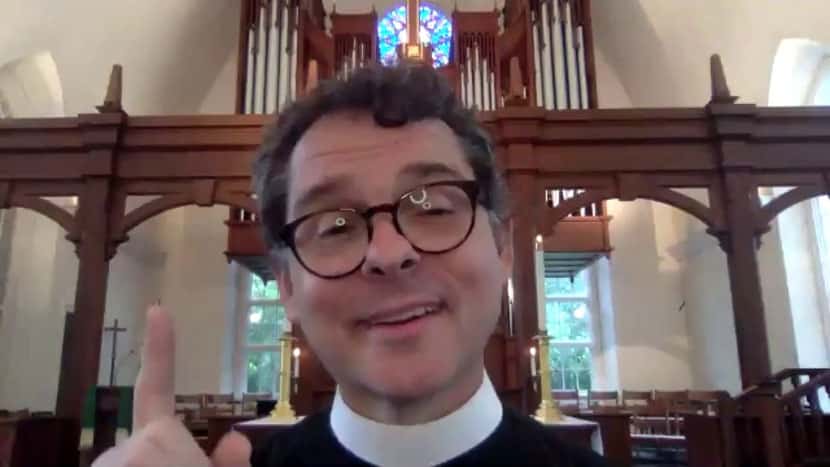Source: The Living Church
The Rev. Hunt Priest, the founder of a society dedicated to helping clergy integrate the use of psychedelic drugs into pastoral care, has been deposed from the ministry of the Episcopal Church by Bishop Frank Logue of Georgia.
An August 5 accord announcing the action concludes a 13-month Title IV process resulting from a complaint filed by the Rev. Joe Welker, a Presbyterian pastor who worked with Priest at Ligare, a nonprofit agency that aims to educate faith communities about the largely illegal hallucinogenic substances that have experienced a massive spike in public interest and advocacy in the last few years.
The Rev. Canon Loren Lasch, the Diocese of Georgia’s canon to the ordinary, indicated in a statement to The Living Church that Logue had offered Priest a possible path to remain in ordained ministry. The diocese’s statement emphasized that it does not make public statements about church discipline processes, but Priest confirmed the matter and the options he was given.
“An accord was reached, with the choice being to resign my ministry at Ligare and return to more traditional work in a parish, or resign my ordination,” Priest told TLC via email. “I have always seen Ligare as an extension of my priestly ministry even though in the end the reference panel of the diocese did not.” Priest resigned as rector of St. Peter’s Church in Savannah in 2021 to found the society.
The accord between the Episcopal Diocese of Georgia and Hunt Priest took effect on August 5
An accord is an agreement of discipline resulting from a Title IV disciplinary process. The diocese cited church canons on “Conduct involving dishonesty, fraud, deceit or misrepresentation” and “Conduct Unbecoming a Member of the Clergy” as the basis for its decision concerning the former rector.
Widely circulated reports said that a 2016 study conducted by Johns Hopkins and New York University was integral in Priest’s shift from parish work to creating a space for conversation about psychedelic healing and Christian spirituality.
In the study, which Priest first learned of through an advertisement, a chemical found in more than 100 species of mushrooms—the hallucinogen psilocybin—was administered to religious professionals.
Priest said that participation in the study brought him significant relief from a “pretty serious case of anxiety” that he had been addressing through therapy. He said the experience helped him understand the roots of his anxiety and manage it. In another media interview, he described the study as a “profound” and “very Christian” experience.
“To me, this conversation is not about hosting psychedelic experiences, or even individually approving of them, but becoming educated about the medical research and seeing a pastoral ministry as we do with anyone receiving treatment of any kind,” Priest told TLC, referring to the intersection of psychedelic healing and Christian leadership.
Endorsing Psychedelics
The 13-month process leading to the agreement between the diocese and Priest included an investigation conducted by an outside lawyer. A four-person reference panel then recommended an accord to Logue. Kathryn Post, writing for Religion News Service, reported that Priest showed RNS a document showing the panel’s conclusions: that he was using his priesthood to lend credibility to his work at Ligare; that he was speaking publicly about the safety of psychedelics rather than their legal use; and that his nonprofit work did not involve the sacramental ministries of the priesthood.
The panel’s conclusions suggested that Priest crossed the line from encouraging curiosity to actively endorsing psychedelics, which remain illegal under federal law.
According to the Drug Enforcement Administration, psilocybin is a Schedule I controlled substance with a high potential for abuse. It is in the same category as heroin and marijuana, though the latter has since been legalized in many states.
Priest said neither he nor Ligare provides psychedelic experiences.
But the Rev. Joe Welker, a former intern at Ligare and now a Presbyterian pastor, raised concerns about Priest’s practices that ultimately led to the Title IV complaint and his deposition from the priesthood.
On his Substack, Welker describes himself as a former “believer in the psychedelic gospel” and a whistleblower to the 2016 study in which Priest participated. Welker alleged that donors acted as researchers, framing the study as part of a grand narrative about psychedelic religion.
A March 2024 New York Times story found that one of the study’s leaders, Dr. Roland Griffiths, faced an ethics complaint from a longtime colleague who said he was running his psychedelic research program more like a “new-age retreat center” than a clinical laboratory. The complaint alleged that Griffiths behaved like a spiritual leader and steered volunteers, including Priest, toward the results he wanted.
Welker has questioned Priest’s account of the study and expressed concern about what he called Priest’s “pattern of deceptive and manipulative behavior.” He said he ended his internship early, believing the nonprofit was acting recklessly, “because their reaction to stories of sexual abuse in psychedelic trials deeply offended me, and they did not prioritize discussion of the risks of psychedelic usage.”
“Every time I have written something about Rev. Priest or his organization, Ligare, in the past two years, I have received an email from someone different about Ligare’s negative impact on their life or a loved one’s life,” Welker wrote in June 2024, two weeks after receiving a cease-and-desist letter from Priest’s lawyers about his Substack.
Welker said that letter, to which he responded publicly, eventually prompted him to initiate the Title IV proceedings after initially hesitating to do so.
A deposition from the ordained ministry is an involuntary disciplinary action, but Priest said in a letter sent to the Ligare community that he resigned from the priesthood. He also referred to Welker’s actions and writings against him and the nonprofit he started as centered on a “personal vendetta.”


Leave a Reply